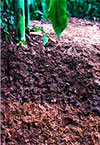As atmospheric CO2 levels rise, soils will likely store less carbon than scientists and climate models had predicted, according to new research published in Science. Scientists have long understood that rising carbon dioxide concentrations in the atmosphere spur
 photosynthesis and plant growth, adding more carbon to the soil. Scientists had thought this soil carbon was relatively stable and could remain locked away for centuries. But the new study, from researchers at Northern Arizona University shows that increasing soil carbon actually spurs microbes to produce more CO2. Higher atmospheric CO2 levels added roughly 20 percent more carbon to the soil, through increased photosynthesis, but they also increased carbon turnover by microbes by 16.5 percent. Many climate models had assumed that far more of the carbon absorbed by soils stayed there for long periods of time. “Our findings mean that nature is not as efficient in slowing global warming as we previously thought,” the lead researcher said.
photosynthesis and plant growth, adding more carbon to the soil. Scientists had thought this soil carbon was relatively stable and could remain locked away for centuries. But the new study, from researchers at Northern Arizona University shows that increasing soil carbon actually spurs microbes to produce more CO2. Higher atmospheric CO2 levels added roughly 20 percent more carbon to the soil, through increased photosynthesis, but they also increased carbon turnover by microbes by 16.5 percent. Many climate models had assumed that far more of the carbon absorbed by soils stayed there for long periods of time. “Our findings mean that nature is not as efficient in slowing global warming as we previously thought,” the lead researcher said.
